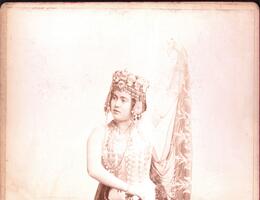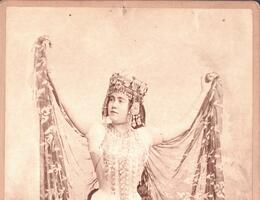
Augusta HOLMÈS
1847 - 1903
Composer, Pianist, Librettist
Augusta Holmès flouted convention at a time when composition was not an acceptable activity for a woman of a certain social status. From a young age, this Anglo-Irishwoman (naturalised French in 1873), who was the god-daughter of Alfred de Vigny, followed an atypical career path. With a talent for music, but also for painting and literature (she wrote most of her libretti), she never attended the Paris Conservatoire. She took private lessons with Lambert (harmony), Klosé (orchestration) and Sainbris (voice), before becoming a disciple of Franck (although, contrary to the claims of several rumourmongers, she was never his mistress). For almost twenty years she was in a relationship with Catulle Mendès, with whom she had five children. Although she favoured musical miniatures, like other female composers of her time, this admirer of Wagner (whom she visited in 1869) also dared to tackle large forms. More than a thousand musicians performed her Ode triomphale en l’honneur du centenaire de 1789 at the Exposition Universelle of 1889. Her operas Astarté, Lancelot du lac and Héro et Léandre were never performed during her lifetime; only La Montagne noire received a stage performance, in 1895, at the Paris Opéra, although it was received unenthusiastically on account of the misogyny and anti-Wagnerism that prevailed at the time. Her works for voice and orchestra as well as her symphonic poems show her fondness for the ancient world (Andromède, Prométhée, Les Argonautes) and her strong tendency to extol national sentiment (Lutèce, Ludus pro patria, Irlande, Pologne).
Scientific publications
Symposia
César Franck and His Legacy
Publication
Augusta Holmès. La nouvelle Orphée
Publication













